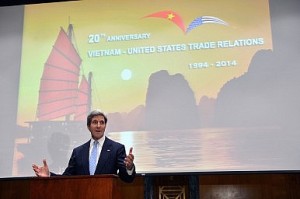Trans-Pacific Partnership: Do it for Vietnam

Image Credit: Flickr/ U.S. Department of State
Tyler Cowen, the prolific economist behind Marginal Revoution (a blog I’ve read for over half-a-decade and recommend), has a unique case in favor of the Trans-Pacific Partnership that relies on simple utilitarian logic. Simply put, the benefits of the TPP coming into effect outweigh the costs in a huge way. Particularly, the benefits for one country—Vietnam—are huge. In fact, Cowen makes that case that the benefit to Vietnam would be so huge that any costs borne by U.S. interest groups and constituencies are marginal. The benefits to Vietnam alone should make the TPP a “no brainer” of an agreement.
The economic reason is simple. The TPP, while it is many things, is at its core a tariff-effacing trade agreement for among its 12 signatories. Vietnam, meanwhile, is not only a poor country, but a country that remains at odds with the values and principles guiding the primary stakeholder behind the TPP: the United States. Vietnam, a Communist country, has undertaken some liberalization on tariffs, “but since then has done some backsliding,” writes Cowen. Specifically, after its entry into the World Trade Organization (WTO), Vietnamese tariffs “on products of interest” to the United States drastically, only to slightly increase them to come in line with the maximum of the range allowed under WTO bindings (see the U.S. Trade Representative’s report on Vietnam here).
Given that Vietnam does a lot of trade with the United States and that the TPP will slash major trade protections on the Vietnamese market, it follows that Vietnamese goods will be particularly competitive in a post-TPP context. In support of these claims, Cowen cites a simulation study by the Peterson Institute on International Economics that demonstrates the same (i.e., that Vietnam, of all countries party to the TPP, stands to benefit the most). A particularly telling statistic for the potential gains for Vietnam in a zero-tariff scenario is the following: in 2012, 34 percent of U.S. apparel imports came from Vietnam, amounting to $7 billion. In a zero-tariff scenario, these imports are suddenly far more competitive.
